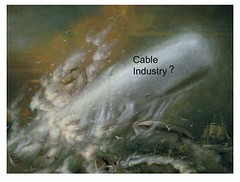 Well, another four months have passed since I last asked this question, but let me pose it again: Where exactly is the FCC's Video Competition Report and why is it taking so long to get it out the door? It wouldn't have anything to do with a certain Chairman Ahab still trying to get his cable whale, would it? No, of course not. I'm sure there's a perfectly rational reason that this 13th Annual report is now something like 18 months past due altogether. Right.
Well, another four months have passed since I last asked this question, but let me pose it again: Where exactly is the FCC's Video Competition Report and why is it taking so long to get it out the door? It wouldn't have anything to do with a certain Chairman Ahab still trying to get his cable whale, would it? No, of course not. I'm sure there's a perfectly rational reason that this 13th Annual report is now something like 18 months past due altogether. Right.
And keep in mind that the data in the 13th report is for a period ending on June 30, 2006, so whenever the report finally comes out the data in it will be well over two years old! That won't exactly reflect the true state of the video programming market considering the significant changes we have since that time, especially the continued explosive growth of online video, VOD, and DVRs.
The reason that I have been making a big deal out of this issue is because this gets to the question of just how "scientific" and "independent" of an agency the FCC really is. We are talking about facts here. Basic data. This is stuff the FCC should be routinely collecting and reporting on a timely basis -- indeed that is what Congress requires the agency to do in this specific case. And yet the agency can't do it because its Chairman is on this Moby Dick-like crusade against the cable industry. By the time this 13th annual report finally sees the light of day, the 15th annual report might be due! Outrageous. (And you wonder why many of us here are so skeptical about empowering the FCC regulating the Internet via Net neutrality mandates! If an over-zealous Chairman can politicize this issue, just think what might happen once we give the agency the authority to regulate the Net.)
Anyway, down below you will find the paper that Barbara Esbin and I wrote about the issue four months ago. Perhaps we should place a little ticker somewhere here on the site that counts each day that passes as we wait for the Commission to produce this report. We can take bets on when the agency's data holdout will end.
